We drove up to Vancouver and flew to Ottawa. Met my brother there and went up to a cottage on a lake called Lac Desert. Deserted, but no desert!
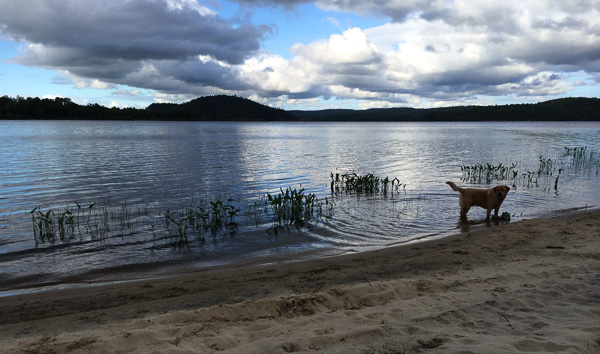
Nice to be so totally off the grid.
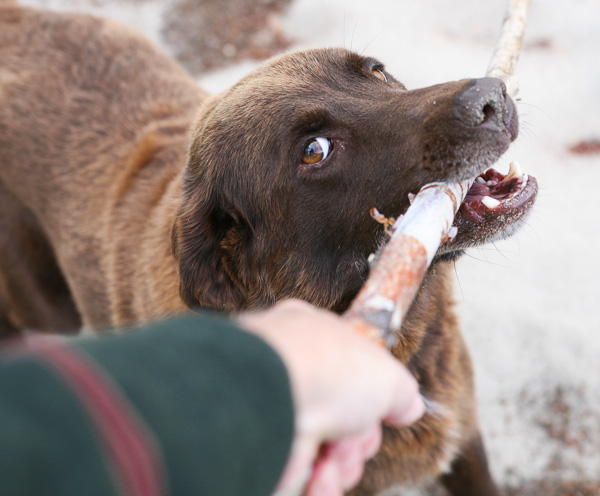
I played with the dogs and they got hyper. Love that crazed, rolling eye.
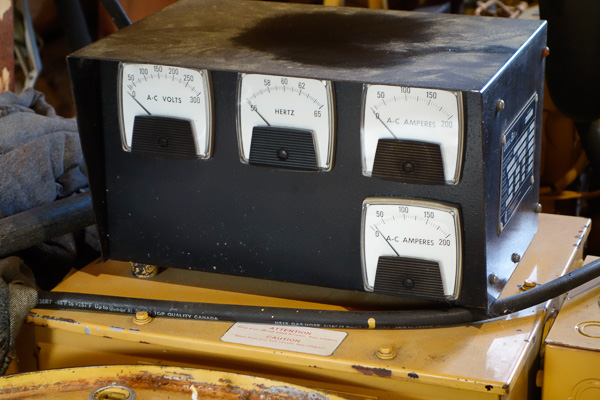
The only way to get to the cottages was by boat, and they had a generator for power—it went off around 9:30 at night.
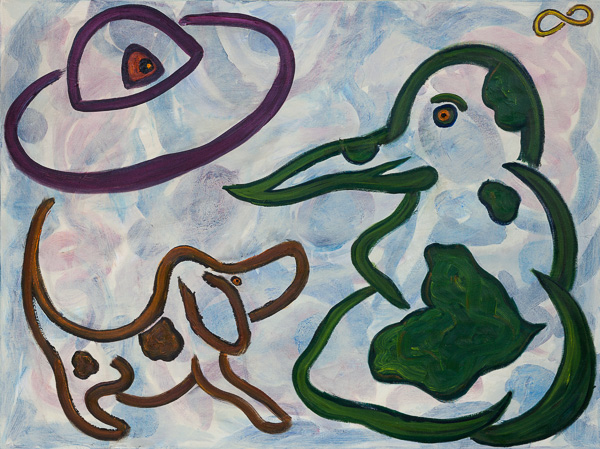
“Dog UFO Gub” acrylic and oil on canvas, July, 2014, 40” x 30”. Click for a larger version of the painting.
Getting totally out of sequence for just a minute, here’s a painting that I almost finished in July, right before our trip, and which I just finalized today. I used a new technique for it—I made a squiggly abstract underpainting with quick-drying acrylic paint, then I covered that with a white haze/glaze of acryulic paint, and then put some free drawings on top with thick oil paint. The underlying subdimensional reality in the background. And in the embossed oily top world we see my dog Arf, a UFO, and the spotted gub who stars in my novel The Big Aha. Also an infinity sign in the sky. I find it pleasing to look at. More info on my Paintings page.
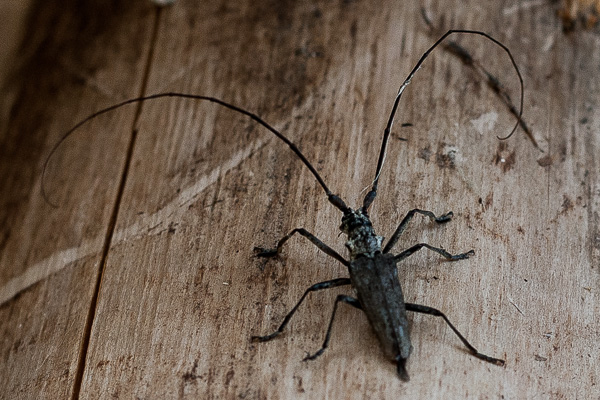
We saw a beetle with really long antennae. My brother’s new wife Joanie said these beetles bite, and they like to eat wood. I didn’t touch him with my bare fingers, instead used the ever-present all-purpose cloth hankie I carry in my pocket.
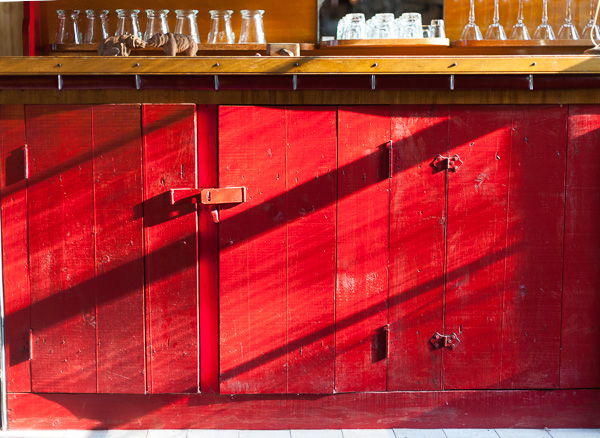
The cabin we were in belongs to Joanie’s family, she’s been coming there for seventy years. Love the slanting afternoon sun on the red doors under the bar.
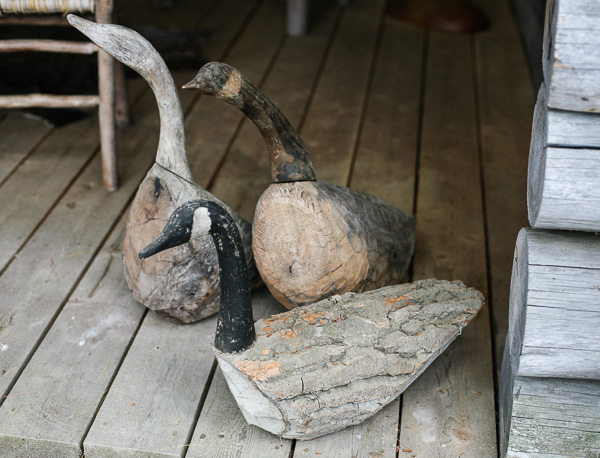
She had three cool decoys, I think the local Algonquin Indians made them.
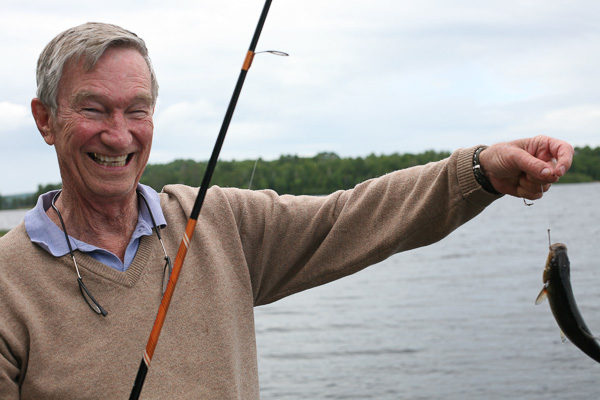
My brother Embry and I did a little fishing—this one went back in the water. On two days we went out with an Algonquin guide, a man whom Joanie had known for about fifty years.
I almost caught a pike, a really nice kind of big Canadian lake fish. The epic had four acts: (1) I hook him, about two feet long, get him close to the boat, he’s fighting and thrashing and twists free of the hook. Should have used a net, but we didn’t have one.
(2) Boat back to Embry and Joanie’s cottage, have lunch, rest, and return to this same beautiful little inlet off the intricate fractal river/lake waterways with a net. Our guide Don hooks a pike, maybe the very same one. I get the net, Don reels him in—after letting him run out the line three or four times, tiring him—I get the net half around the pike, the lure snags on the net, the pike twists free.
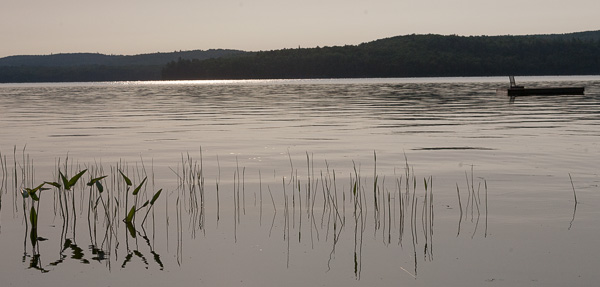
(3) The next morning Embry and the guide go out without me and return with… “A perch,” Sylvia tells me. “I think it was a big perch.” But, no, it’s a pike! Don cooks him for our dinner, breading him and frying him in chunks in bacon grease, it’s good to eat him.
(4) That evening I motor back to the special inlet with Embry and Don, and I use the same lure that Don used, but the original Magic Pike isn’t there.
The lake water wasn’t all that cold at Joanie’s, and the water had that limp, kind of jelly-like smoothness of fresh water. I went swimming every morning.
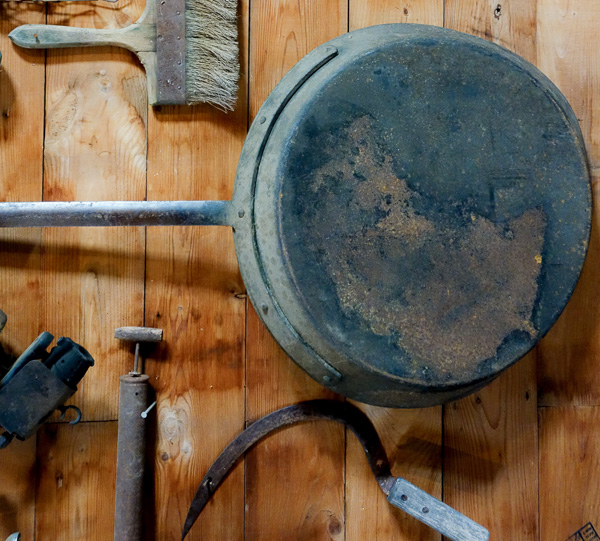
They had one antenna with a wireless connection, and we’d walk over to the little log building where it lived, the “temple of the internet” and get our fix. They had cool old junk hanging on the walls in there, just like at Dick Scheinman’s house on the Lost Coast.
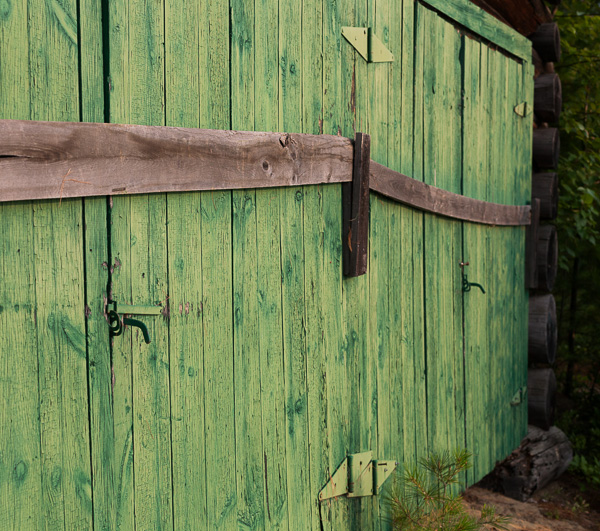
Not that anything important was coming in. But at this point we’re so much in the habit of checking email, Twitter, Facebook, etc., that it feels like basic life support.
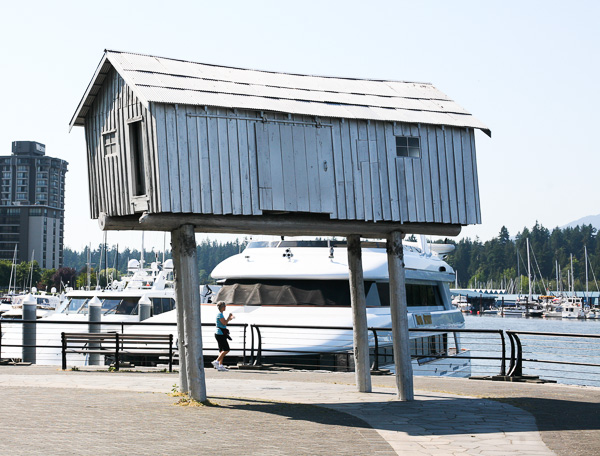
[This is a cast aluminum house-shaped sculpture we saw in Vancover in the harbor. More about Vancouver in a later post.]
While I was in Vancouver and on the plane to Ottawa, and at the lake, I read Roadside Picnic, the late 1970s Russian SF novel by Boris and Arkady Strugatsky—I’ve heard about it for years, but hadn’t read it, and now I’d picked up a new edition at Powell’s Books in Portland.
A really admirable book, starting with the great premise that some aliens stopped on Earth, as if for a roadside picnic, and left all sorts of debris in a “Zone” they polluted. And the stuff is, for us, incredibly useful and terminally incomprehensible. The Strugatsky boys (and their English translator) made up lots of cute names for the debris. Happy ghosts, empties, golden sphere, grinder, bug traps.
The book has an exhilirating, heart-breaking ending. It’s a masterpiece.
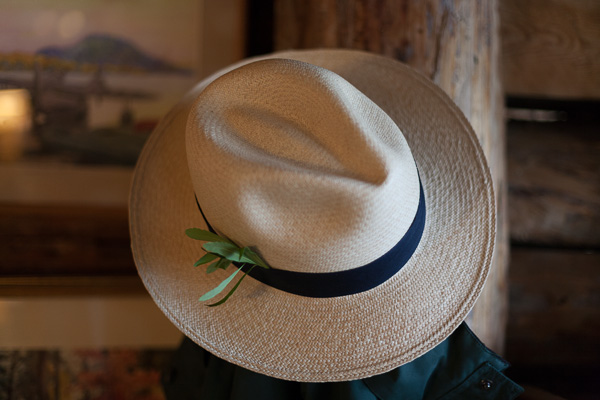
In my current lost-in-the-woods state regarding my next novel, I naturally start thinking that I might learn some lessons from Roadside Picnic.
The miracles in the book are intriguing and staggering, but they’re kind of peripheral. The very fact that the miraculous alien tech isn’t spelled out makes it that much more alluring. The Strugatsky boys leave you the room in which to dream. Borges’s Tlön, Uqbar, Orbum Tertius was similarly sketchy and suggestive.
The emphasis is always on character—with a lot of repeating inner monologues. What I call wheenk. The wheenk is really the core of the book. I typically have a higher action/wheenk ratio than in Roadside Picnic. But perhaps readers like a lower ratio than the one I’m typically using.
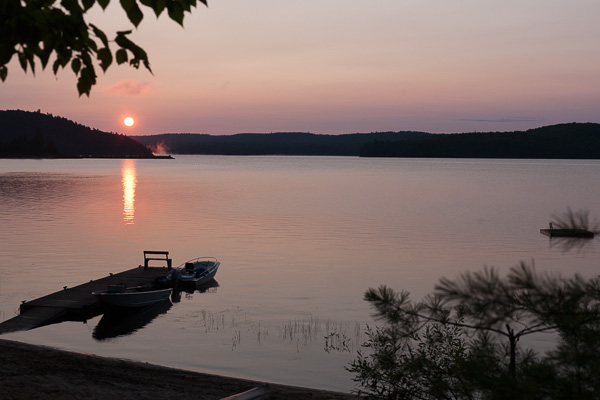
And then I read a travel book in the cottage, Evelyn Waugh, A Bachelor Abroad: A Mediterranean Journal. Written in 1929, after Waugh’s novels Decline and Fall and Vile Bodies. Great fun. Love his style, his dry wit, his snobbery.
This is a classic found-in-a-summer-cabin book, a nice clean hardback first edition, inscribed by the original owner on December 25, 1933. Great to spend a week outside of time.









August 4th, 2014 at 5:10 am
Makes you wonder how far into the future some of your stuff will reach. Imagine someone finding an ancient copy of FREK in a long-sealed dome on Mars a hundred or so years from now, and turning the paper pages with wonder.
August 13th, 2014 at 6:57 pm
I love that your enjoying yourself up here. Please write more soon,
Keith.